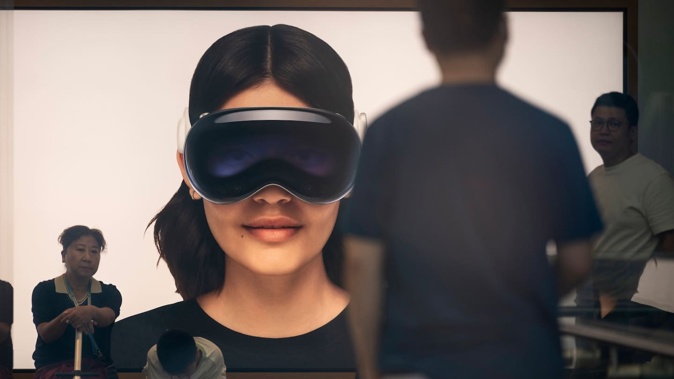
Apple Inc has updated its top-of-the-line iPad Pro, Vision Pro headset and 14-inch MacBook Pro, rounding out a series of product refreshes before the crucial holiday-shopping season.
The new products, announced Wednesday, all use Apple’s latest in-house chip, called the M5. With the exception of a new headband for the Vision Pro, the devices don’t offer major exterior design changes. They are available to preorder now and will arrive in stores on October 22. Prices remain unchanged from previous models.
The more powerful chip should help Apple’s tablet surpass many high-end laptops in performance. Combined with long-overdue multitasking improvements that were introduced with iPadOS 26 last month, iPad owners will finally be able to put that horsepower to greater use.
Apple is betting that the new models will bolster demand after disappointing iPad sales in the June quarter. Some shoppers may have been waiting for the updated version before making purchases.
Like its direct predecessor, the M5 iPad Pro has an incredibly thin design and includes a multilayered “tandem” OLED display – an approach that offers more brightness and efficiency. Apple is maintaining the standard 11-inch and 13-inch sizes of recent models, and they have the same US$999 and US$1299 starting prices as before.
With iPadOS 26, Apple overhauled its approach to multitasking with a new system that more closely resembles the way users interact with software on a Mac. Many different apps can now be used on the iPad’s screen at once, with more intuitive controls for resizing and rearranging windows.
Other improvements include a Mac-like menu bar at the top of the screen when working inside apps and the ability to place folders directly in the home screen dock. All recent iPad models can take advantage of the revamped windowing interface, but the iPad Pro is able to juggle the most apps simultaneously.
Vision Pro
Apple is equipping the second-generation Vision Pro with the brand new M5 chip. It offers a big jump in overall processing power compared with the ageing M2 from the original headset. The company’s latest silicon should let the Vision Pro handle advanced augmented reality experiences, as well as processing-heavy artificial intelligence features.
The more ergonomic head strap, meanwhile, is designed to reduce fatigue and discomfort that can result from wearing the Vision Pro for an extended period of time.
Since its release in early 2024, the Vision Pro has been viewed as too heavy and expensive to become a hit product. But it’s still an impressive technology showcase. The device’s displays are top-notch and offer a better movie-watching experience than other headsets. Even so, Apple has been slow to roll out immersive 3D videos that play to the Vision Pro’s strengths.
The Vision Pro now has better processing power and an ergonomic head strap, targeting business use.
With many consumers unwilling to splurge on a US$3499 product, Apple has increasingly been touting the Vision Pro as a good fit for businesses or organisations.
Even as it introduces a new Vision Pro, Apple has already shifted its priorities to smart glasses, a category that consumers have shown far greater interest in.
The company recently shelved a planned overhaul of the Vision Pro that would have brought a lighter design and more affordable price, Bloomberg has reported. Instead, it’s racing to catch up with Meta Platforms in the glasses market. The company’s just-released Meta Ray-Ban Display glasses are an impressive demonstration of the progress it’s made in the category.
Take your Radio, Podcasts and Music with you









